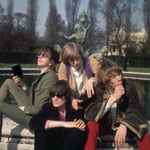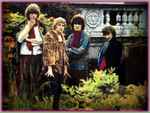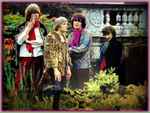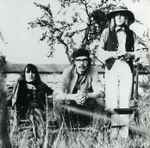Soft Machine - Rubber Riff
Table of Contents
Download
Filename: soft-machine-rubber-riff.rar- MP3 size: 121.8 mb
- FLAC size: 1539.9 mb
Tracks
| Track | Duration | Preview |
|---|---|---|
| Sam's Short Shuffle | 2:24 | |
| Pavan | 2:43 | |
| Crunch | 2:40 | |
| Hi-Power | 2:58 | |
| Travelogue | 2:45 | |
| Melina | 2:52 | |
| Crunch | 2:40 | |
| Porky | 2:49 | |
| Gentle Turn | 3:16 | |
| Sam's Short Shuffle | 2:24 | |
| Gentle Turn | 3:16 | |
| City Steps | 3:03 | |
| Hi-Power | 2:58 | |
| City Steps | 3:03 | |
| Porky | 2:49 | |
| Sam's Short Shuffle | 02:24 | |
| Jombles | 3:01 | |
| Travelogue | 2:45 | |
| Splot | 1:57 | |
| A Little Floating Music | 2:51 | |
| Splot | 1:57 | |
| Pavan | 2:43 | |
| Rubber Riff | 2:42 | |
| Jombles | 3:01 | |
| Rubber Riff | 2:42 | |
| Little Miss B | 2:40 | |
| Little Miss B | 2:40 | |
| A Little Floating Music | 2:51 | |
| Melina | 2:52 |
Images






Catalog Numbers
- VP190CD
- MSIF-3306, VP190CD
- VAL 003
- BP190CD
- HST020CD
- VPJ-224
Labels
- Voiceprint
- MSI , Voiceprint
- G. & P. Music
- Blueprint
- Gonzo Media Group
- Voiceprint Japan
Listen online
- ouvir online
- escuchar en línea
- écouter en ligne
- lytte på nettet
- online anhören
- ascolta in linea
- online luisteren
- lyssna på nätet
- kuunnella verkossa
Formats
- CD
- Album
- Reissue
- Unofficial Release
Companies
| Role | Company |
|---|---|
| Phonographic Copyright (p) | Voiceprint |
| Copyright (c) | Voiceprint |
| Pressed By | DADC Austria |
| Recorded At | De Wolfe Studios |
Credits
| Role | Credit |
|---|---|
| Acoustic Guitar | John Etheridge |
| Electric Guitar | John Etheridge |
| Liner Notes | John Etheridge |
| Bass Guitar | Roy Babbington |
| Design | Nick Bantock, Peter Hartl |
| Drums | John Marshall |
| Percussion | John Marshall |
| Executive-Producer | Rob Healing |
| Keyboards | Carol Barratt |
| Flute | Karl Jenkins |
| Saxophone | Karl Jenkins |
| Composed By | Karl Jenkins |
| Producer | Rob Ayling |
| Bass | Roy Babbington |
Notes
- Originally released in 1976.
- Recorded at De Wolfe Studios, Soho, London, around April 1976 ( from John Etheridge's liner notes )
- The project was instigated and composed by Karl Jenkins for library music use and the other members of the Soft Machine at the time plus Karl's wife Carol Barratt played on the session. All the recording was completed in one day and the band played live in the studio - no overdubs being used. ( from John Etheridge's liner notes )
- From the inside of the booklet :
- 1 Crunch ( Driving, Riffy, Dramatic ) 2:40
- 2 Pavan ( Slow, Dignified, Slightly Sad ) 2:43
- 3 Jombles ( Heavy Rock, Mid-Tempo, Guitar ) 3:01
- 4 A Little Floating Music ( Delicate, Rippling, Soft ) 2:51
- 5 Hi-Power ( Up-Tempo, Heavy, Active ) 2:58
- 6 Little Miss B ( Relaxed, Dreamy ) 2:40
- 7 Splot ( Slow, Forceful, Beaty ) 1:57
- 8 Rubber Riff ( Busy, Fast ) 2:42
- 9 Sam's Short Shuffle ( Up-Tempo, Exuberant, Guitar Feature ) 2:24
- 10 Melina ( Breezy, Light - Change Of Tempo ) 2:52
- 11 City Steps ( Bright, Neutral, Mid-Tempo ) 3:03
- 12 Gentle Turn ( Lilting, Wistful Flute Feature ) 3:16
- 13 Porky ( Restrained, Funky, Mid-Tempo ) 2:49
- 14 Travelogue ( Breezy, Fast ) 2:45
Barcodes
- Barcode (Scanned): 5020522395526
- Matrix / Runout: VP190CD 15 A0 [DADC Austria logo]
- Mastering SID Code: none
- Mould SID Code: none
- Barcode: 4938167004417
- Matrix / Runout: VAL 003
- Barcode: 604388108923
- Barcode: 5060230860480
- Barcode: 2020104000141
About Soft Machine






Soft Machine are an English rock and jazz band from Canterbury formed in mid-1966, named after the novel The Soft Machine by William S. Burroughs.
Australian poet, guitarist, singer, composer and performance artist moved to Paris in 1960. Inspired by the emerging 'Beat Generation' of writer's works he'd discovered whilst working in a Melbourne bookshop he moved into a room in Paris's 'Beat Hotel' and spent time around the city's Latin Quarter. There, he rubbed shoulders with and , gaining free access to the area's jazz clubs. Influenced by the music philosophies of he formed the , a free-jazz outfit which performed in Burroughs' theatre pieces based on that writer's novel 'The Ticket That Exploded'.
In 1961 Allen travelled to Canterbury, England, where he met 16 year-old (who was the son of his landlord). Their mutual interest in jazz resulted in a few gigs, in London in 1963, as the Daevid Allen Trio (with on bass and occasionally guesting on piano). Around the same time, Wyatt formed the with the Hopper brothers, Hugh and Brian Hopper, with on vocals.
The impetus behind the formation of occurred in a meeting of Daevid Allen and Kevin Ayers with Texan millionaire Wes Brunson in Deya, Majorca, on Easter Sunday 1966. Brunson agreed to put up the money for a new band, which allowed the group to buy equipment and rent a rehearsal room near Canterbury. The original line-up consisted of Robert Wyatt on drums and vocals, Mike Ratledge on keyboards, Daevid Allen on guitar and Kevin Ayers on bass and vocals. From May 1966 they gigged as Mister Head (aka Mr Head) and became Soft Machine in August 1966.
The name was taken from a William S. Burroughs novel 'The Soft Machine' (part of The Nova Trilogy), with agreement from the author. The title The Soft Machine encapsulates the Human Body, and the main theme of the book - as explicitly written in an appendix - concerns how control mechanisms invade the body. One poem, entitled Mens (Man, as in 'human'), by Dutch-American hematologist and poet Leo Vroman starts with the line: "Man is a soft machine..."
Mike Ratledge says of this : "... Soft machine was a generic term for the whole of humanity, and we were all soft machines... I guess our basic assumption was that what we liked, everybody else was going to like as well, that we all had things in common, and therefore we all are soft machines, and we were all going to like Soft Machine music. It might have been a false assumption, but I hope it's true".
In January 1967, the band's first single release, , was recorded.. Celebrating its release on February 22nd 1967 the band gave a press conference at The Speakeasy, performing that evening at The Roundhouse as the opening act for the - where Hendrix jammed with them on bass.
Allen recalls their introduction to The Speakeasy by , the promoter, producer, founder of the Crawdaddy Club and original manager of both and ;
He would take us there and ply us with whiskeys on the expense account. Wed meet all the big stars at the time. It was like being at court, only a rock n roll court. Cause were there, the Rolling Stones were there everybody, all the big names, would gather at the Speakeasy at this particular time.
.
Three months later, a collection of demos was recorded at DeLane Lea Studios with producer , but not officially released until 1971 as two compilations on the French label. At that time, Soft Machine had already become something of a 'cult' band on the London psychedelic scene, gigging at places like the Zebra Club, The Marquee, The Roundhouse, UFO (Underground Freak Out club) and Middle Earth. Light shows were also developed with Mark Boyle's Sensual Laboratory. On April 29th, 1967, they took part in the '14 Hour Technicolor Dream', an event set up by the underground paper 'International Times', which also featured , , , , , , and artists such as and .
During the summer of 1967 the band toured France, performing at psychedelic events along the Cote dAzur such as s
Sunlove Happening
and s
La Nuit Pschedelique
. For three weeks they provided daily musical
transmissions hallucinatoires
for wildly popular performances of
Le Désir Attrapé par la Queue
, a Pablo Picasso play produced by Lebel at the Festival de la Libre Expression outside Saint-Tropez. A legendary performance of
Do It Again
helped Soft Machine to make an enormous impression in France and, by the end of the Summer of Love, they became the favorite band of the French avant-garde.
On the way back Daevid Allen was refused re-entry to England and stayed in France, moving on to various projects before forming two years later, while Robert Wyatt, Mike Ratledge and Kevin Ayers decided to carry on Soft Machine as a trio.
In February 1968, Soft Machine embarked on a three month US tour (opening for the ), recording their first album during their touring schedule in New York in four days in April 1968, with production handled by Tom Wilson and former bassist and Hendrix producer . Although quickly made and not particularly well-recorded, the band's eponymous album (1968) is now considered a classic of the extraordinarily creative post-psychedelic and pre-progressive period of the late 1960's.
The band split up in December 1968, re-formed in February 1969 and carried on until the late 1970's through many line-up changes and leaving no original member onboard. It re-formed briefly in 1980 and 1984. Robert Wyatt formed in October 1971. "Matching Mole" is a clever mis-pronounciation of "La Machine Molle
Name Vars
- Karl Jenkins' Soft Machine
- Soft Machine & Heavy Friends
- Soft Machine Family
- Softmachine
- The Original Soft Machine
- The Original Soft-Machine
- The Soft Machine
- ¶û½ÕÈûÞ·üó
- ½ÕÈûÞ·üó
Members
- Robert Wyatt
- Daevid Allen
- Kevin Ayers
- Andy Summers
- Jack Bruce
- Hugh Hopper
- Elton Dean
- Theo Travis
- Nick Evans
- Mike Ratledge
- Lyn Dobson
- Marc Charig
- Karl Jenkins
- John Marshall
- Roy Babbington
- Allan Holdsworth
- Ric Sanders
- Ray Warleigh
- Alan Wakeman
- Phil Howard
- Fred T. Baker
- Steve Cook
- Asaf Sirkis
- John Etheridge
Related albums
2013
1969
2019
1982
2008
2010
2012
1963
2007
2012
2008
1960
1962
1991
2017
2017
2009
2001